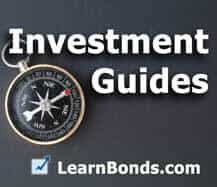
Generally speaking, the prices are delayed by 5 – 15 minutes. As most bond prices don’t move as quickly as stocks (with the exception of Treasury and Agency bonds), a delayed bond price is a pretty good barometer of where the market is currently trading.
Featured Bonds Broker 2020

- Minimum deposit and investment just $5
- Access to Bonds, as well as Stocks and Funds
- Very user friendly platform

Where to Find Municipal Bond Prices
If LearnBonds gave out gold medals for useful tools, BondView would certainly win one. They have an excellent indicative bond pricing engine for Municipal Bonds which not only takes into account the individual bond’s recent pricing activity, but the activity of similar bonds. This enables Bond View to provide an approximate indicative bond price even when the bond has not traded in some time.
Free Service Offerings: Bond Screener, Delayed Transaction Data (Last Price), Indicative Pricing
MunicipalBonds.com has a great table showing benchmarking the current yields for Municipal Bonds by state and maturity date.
Free Service Offerings: Bond Screener, Delayed Transaction Data (Last Price), Municipal Rate Table
All brokers must report their municipal bond trades to the MSRB (Municipal Securities Rulemaking Board) within 15 minutes of the trade or face potential regulatory action. EMMA is their system for collecting and distributing market data.
Free Service Offering: Bond Screener, Delayed Transaction Data.
Agency and Corporate Bond Prices
FINRA – TRACE
All brokers must report their agency and corporate bond trades to FINRA within 15 mintues of the trade or fact potential regulatory action. TRACE (Trade Reporting and Compliance Engine)is their system for collecting and distributing bond price data. In addition, they have tables which show the number of bonds rising and declining in value at the end of the day.
There are three broad types of bond prices that frequently are reported:
Last Price
Last price is the price at which the last trade in the bond was executed. Last price can be extremely useful when the last trade was recently reported. In may cases, particularly in municipal bonds, the last trade can be weeks or months old, providing misleading information. Also, you want to be aware of who was involved in the last trade.
If the trade was between two dealers, then the last price will be a better market indication then if the trade was between a dealer and a customer. (The customer might have traded on an off market bond price.)
Bid / Ask Spread
All securities have a bid/ask spread. The ask is the current price where you can sell a security and the bid is the price at which you can buy. In most stocks, the difference between the bid and ask is very small – 1 to 2 pennies per share. This is not the case with bonds. The spread can be 1, 2 or even 3 percent wide.
A 3 percent spread would mean a difference of $30 per bond being bought. When there is a wide spread, most dealers will call around to each other and see if they can improve on it. The real price of the bond can be anywhere within that very wide spread.
Indicative / Estimated
Because of the problems mentioned above, there are a few services that provide independent valuation of bond values. However, just because they believe that the value is at a certain price does not mean that you will be able to obtain that price on the market.
This lesson is part of our Free Guide to the Basics of Investing in Municipal Bonds and our Free Guide to Investing in Corporate Bonds. Continue to the next municipal bond lesson here and the next corporate bond lesson here.
Glossary of Bonds Terms

A bond is when companies or goverments need to generate funds and when you invest you will receive you lump sump back with interest at the end of your agreement.

Bonds issued by the United States Department of the Treasury to finance government spending.

A Treasury Note are bonds issued by the United States Department of the Treasury and last up to 10 years.

Treasury securities are the bonds issued to investors by the U.S. government

A Municipal Bond is usually issued by local Governments to finance public projects such as roads, schools, and airports. You will recieve you lump sum and interest back at the end of the term.

A Corporate Bond is issued by businesses to raise funds for expansions or projects. You will recieve you lump sum and interest back at the end of the term.

A Bond that has no interest rate but your investments are entered into prize draws to win £25 to £1mil.

Usually offered by Banks and Building Societies, Saving Bonds will last for a fixed term and earn interest. You are not able to access the money during the fixed term.

A Fixed Bond will start and end with same Interest Rate.
Trusted & Regulated Stock & CFD Brokers
What we like
- 0% Fees on Stocks
- 5000+ Stocks, ETFs and other Markets
- Accepts Paypal Deposits
Min Deposit
$200
Charge per Trade
Zero Commission on real stocks
64 traders signed up today
Visit Now67% of retail investor accounts lose money when trading CFDs with this provider. You should consider whether you can afford to take the high risk of losing your money.
Available Assets
- Total Number of Stocks & Shares5000+
- US Stocks
- German Stocks
- UK Stocks
- European
- ETF Stocks
- IPO
- Funds
- Bonds
- Options
- Futures
- CFDs
- Crypto
Charge per Trade
- FTSE 100 Zero Commission
- NASDAQ Zero Commission
- DAX Zero Commission
- Facebook Zero Commission
- Alphabet Zero Commission
- Tesla Zero Commission
- Apple Zero Commission
- Microsoft Zero Commission
Deposit Method
- Wire Transfer
- Credit Cards
- Bank Account
- Paypall
- Skrill
- Neteller
What we like
- Sign up today and get $5 free
- Fractals Available
- Paypal Available
Min Deposit
$0
Charge per Trade
$1 to $9 PCM
Visit Now
Investing in financial markets carries risk, you have the potential to lose your total investment.
Available Assets
- Total Number of Shares999
- US Stocks
- German Stocks
- UK Stocks
- European Stocks
- EFTs
- IPOs
- Funds
- Bonds
- Options
- Futures
- CFDs
- Crypto
Charge per Trade
- FTSE 100 $1 - $9 per month
- NASDAQ $1 - $9 per month
- DAX $1 - $9 per month
- Facebook $1 - $9 per month
- Alphabet $1 - $9 per month
- Telsa $1 - $9 per month
- Apple $1 - $9 per month
- Microsoft $1 - $9 per month
Deposit Method
- Wire Transfer
- Credit Cards
- Bank Account



